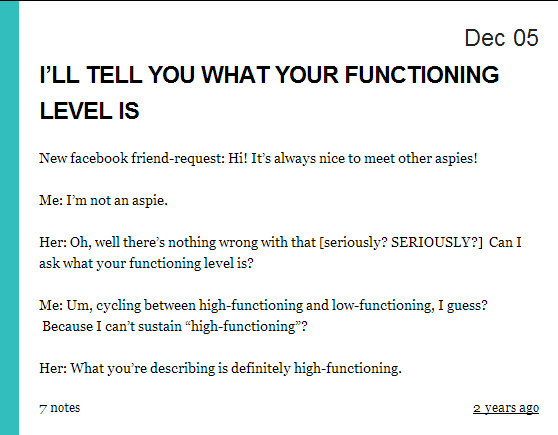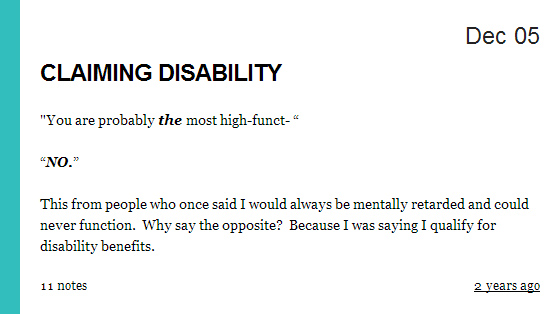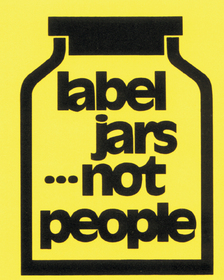|
|
What’s your IQ?
Is she a little bit pregnant?
Will you always be this way?
|
These questions sound absurd and they would never be asked by strangers, yet parents of adult children who have intellectual or developmental disabilities (ID/DD) get asked similar questions all the time. I can’t tell you how many times someone has asked me “Is your son high functioning?” The question is, to me, irrational. First of all what
IS high functioning? There is
no clinical definition. As a social construct, most people use it to indicate a higher IQ than what is typical for a certain population. If we accept the premise of high functioning then think about what that says about the rest of the population in contrast.
While IQ certainly has something to do with the unstable definition of what high functioning means, the complete impact of the term is more subjective. An online search yields many references to different types of disabilities. There’s quite a bit of information in relation to autism. It seems that people use the term high functioning autism to indicate IQ levels that do not qualify for “mental retardation” status. But what do people with autism say about the label? One unique site is edited by a woman who identifies as autistic. She solicits and posts different opinions on the term on her Tumblr page called “
What is “High-Functioning?”” She defines the page and her goal:
A list of different ways people use the word “high-functioning” about people with developmental disabilities; an attempt to figure out what it actually is supposed to mean.
Interested humans–people with disabilities, staff, family members, allies, and people who are more than one of those things–are invited to share different ways they have heard the term “high-functioning” be used.
One of my favorite posts on this page tells about an experience she had with a stranger on social media:
She supplies a link to another article that is also eye-opening. The site called “No Stereotypes Here” offers a blog post from 2011 called “
Functioning Labels and Meaning.”
It’s not about vocal skills or IQ scores, as I’ve seen proposed in the Autism communities, or frequency of symptoms and self-harming behaviour, as defined by the Global Assessment of Functionality. It’s about visibility.
Think about it; that’s what really is meant when people label functioning status to disabled people, the level in which the disability is visible to other non-disabled people.
|
That, to me, sums it up. How comfortable does the person with a disability make temporarily able bodied people? So when people ask me if my son is “high functioning” I hear “will I feel awkward around him?”
|
|
How does one answer this question? As a parent, my first instinct is YES! He has many strengths. He’s great at “Name that band” and picking up on other people’s feelings. He can site read the digital channel guide and navigate his Ipod. He makes me smile and laugh every day.
My answer would depend on who was asking.
In a general conversation, if I was inclined to answer rather than explain why I don’t agree with the question, I would stress the joys my son brings to me and others who take the time to know him. In a more formal situation, with doctors who have a more clinical, pre-conceived definition in mind, or with workers / teachers who are the gatekeepers to services it would be completely different.
Another post from “What is High-Functioning?” paints that picture:
From the time our children are infants, we as parents are put in the position of asking for help. Early intervention service, classroom adaptations, access to therapies, transition services, Medicaid waivers, assisted living, and a host of other important services depend on our ability to accurately access our child’s needs rather than his or her strengths. It’s a delicate line we walk and the reason I react so negatively to questions like: “Does he have a mild case of Down syndrome?” (Yes, people do ask that) There is no ‘mild case.’ You either have Down syndrome or you don’t. It’s one of the MANY misconceptions that the general public still has about Down syndrome specifically, and ID/DD in general.
|
|
Why do we need to add descriptors on top of labels? Why are parents made to feel pain, sorrow, or guilt when their child isn’t seen by the majority as high functioning? Even within our own community there’s a tendency to highlight the exceptional and ignore everyone else.
|
We’re told that we need to have high expectations for our children so that we don’t limit their possibilities. The initial adjustment to an ID/DD diagnosis requires us to realign our hopes and dreams for our child. So, we share and celebrate the super stars while proclaiming outwardly “See, she has Down syndrome and can do that, my child could do that too someday!” Secretly, we all think “But maybe she won’t.”
I’m writing today to say: “That’s OKAY!” Maybe she won’t star in television show – most people don’t. Maybe he won’t graduate from college – it’s not for everyone no matter how much our society seems to think it should be. Maybe she can’t give a speech or receive an award for outstanding inspiration to others – don’t worry, I won’t either. It’s okay! We shouldn’t define our children (disabled or not) based on other people’s accomplishments or expectations. As parents, our job is to simply love and encourage our children to be the best version of themselves. That includes celebrating the “little” things, being proud of each new accomplishment, and encouraging our children’s self-esteem to allow them to keep reaching for the stars.
This morning my son beamed with pride when he said “took my pills.” “I’m smart!”
To some, the fact that I have to make sure he gets to the doctor, has his regular blood work, get the prescriptions filled, and make sure that his daily doses are placed in his pill box count as “needs” on the activities of daily living scale. Certainly not “high functioning.”
|
|
To him, and his very proud mother, it’s a victory worth celebrating! He remembered to take his pills on his own, and recognized what day it was on the weekly dispenser. Most importantly – it’s a reminder to me that we all have struggles and need help occasionally, but we should allow ourselves to be proud of what we
can do.
Labels, descriptors, and socially constructed definitions should not keep us from enjoying each other for who we are.







